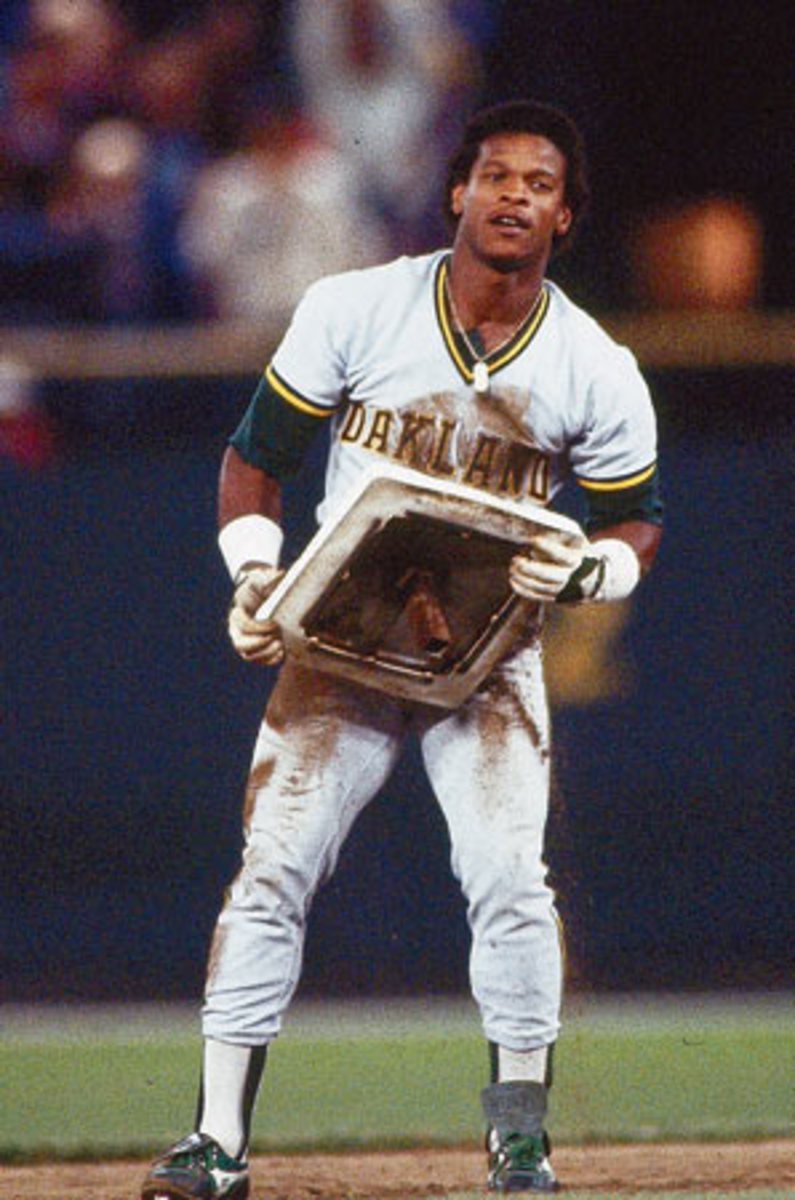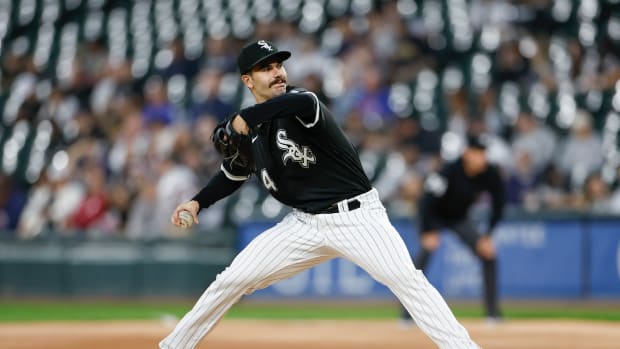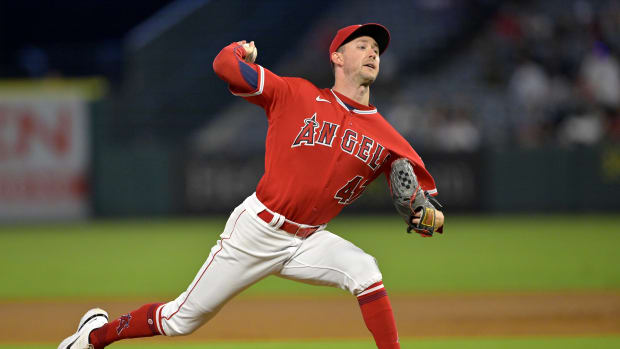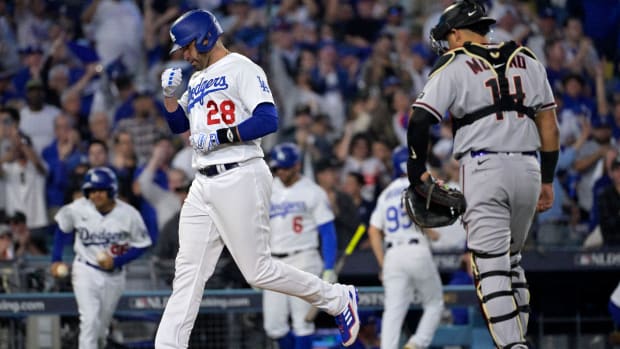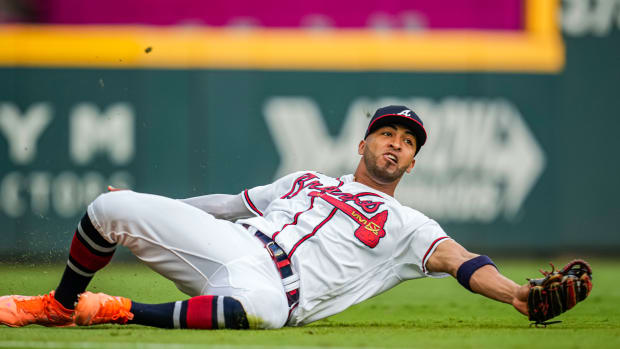Stolen thoughts
Sports Illustrated senior writer Chris Ballard sat down with Rickey Henderson, baseball's single-season and career stolen base king, and Jimmy Rollins, one of the game's most proficient active base stealers, to find out what it takes to become a master thief. To read Ballard's story on baseball's new era of base stealers and their possible impact on October, click here.
On the philosophy behind running:
"People say I stole a lot of bases. I stole the bases for a reason. I crossed the plate. If I steal a base and my hitter couldn't get me in, then you got to take me out to dinner. You got to do something, because I stole that base, I busted my butt. I need a dinner. I'm giving you a chance to get yourself an RBI. You can't get me in from third base with less than two outs? Oh no, you got to take me out to dinner! Or I'm going to order dinner on you."
On being a Moneyball player before there was Moneyball:
"I was about how could I get on base 400% of the time. [Editor's note: We assume Rickey means 40%, though you never know with Rickey]. They called me Run Man. That's what I wanted the most. I wanted to score. I could go 0-for-4, but if I have two runs scored, I did my job.
"I was walking and they couldn't pitch to me and I wasn't going out of the strike zone. I thought maybe if I walk, I get two bases. But I if get a double I only got a chance for one. If I hit a home run, then I wasn't getting no bases. So I was dictating on getting two bases."
On developing his slide:
"I started going headfirst after learning from a guy in Triple-A named Mike Rodriguez. I wanted to know how to dive into the base because I was getting strawberries on my knees and strawberries on my ass [from sliding].
"I started going headfirst but when I started going headfirst I was pounding my body, I was hitting the ground so hard. I was thinking about headfirst versus feetfirst and wondering which would save my body. With headfirst I worried about pounding my shoulders and my hands and with feet-first I would worry about my knees and my legs. I felt that running was more important to me, with my legs, so I started going headfirst.
"I got my [low-to-the-ground] technique from airplanes...I was on a plane and asleep and the plane bounced and when we landed we bounced and it woke me up. Then the next flight I had the same pilot and the plane went down so smooth. So I asked the pilot why and he said when you land a plane smooth, you get the plane elevated to the lowest position you can and then you smooth it in. Same with sliding. Gravity is saying how far up you are when you dive. If you dive when you're running straight up then you have a long distance to get to the ground. But the closer you get to the ground the less time it will take."
On sliding through the bag:
"I was hitting the dirt so smooth, so fast, when I hit the dirt, there wasn't no hesitation. It was like a skid mark, like you throw a rock on the water and skid off it. So when I hit the ground, if you didn't have the tag down, I was by you no matter if the ball beat me, I was by you. That was what made the close plays go my way, I think. There wasn't that hesitation, that they got a chance to put it down. They had to put it down quick. Sometimes I had to hold on or I got tagged out by oversliding the base."
On picking up a pitcher's cues:
"You analyze and try to pick out something. Certain guys, they can see a guy do a certain thing with their glove and know what pitch is coming. I couldn't do that. But I can get on first base and I can tell you by his move if that pitcher is going to first base or home plate every time. Now I see it and I tell guys, 'Wow you could have been down there.'
"On a pickoff, people say, 'The pitcher's got a great move.' Why am I going to worry about his move? If he's got a great move to home plate, then I slow down. But if he's got a great move to first base, I could care less. He could have the best move in America, you couldn't get me at first base."
On his habit of dancing off first base like, as one former teammate put it, a "laughing puma":
"If you're drawing attention, you're giving your hitter a better pitch to hit. If you're always faking then they don't know if or when you're going to go. When you're not faking, then you tense up. Then someone's going to read you. I say always keep moving.
"You got to creep, creep. You got to play games with them. You got to make them know you're back there. Once they know you're back there, they gonna panic and a lot of time they gonna give that hitter a great pitch to hit."
[A sidenote: When I asked Davey Lopes, the Phillies baserunning coach, about this philosophy, he had a decidedly different view. His response: "C'mon man, this is the professional leagues, not Little League. People are going to think you're some kind of fool over there."]
On the chances of another hat trick --stealing second, third and home in the same game -- which hasn't happened since 1996, when Eric Young pulled if off:
"Nah, they don't try to steal home anymore. Pitchers don't go into the windup anymore. Home base was mainly windup. You see guys see steal home base, it wasn't from the stretch."
On what would happen if he raced Jose Reyes:
"I'm quicker than him first to second. I'm quicker than all of them out there. My first two, three steps are too explosive. My first four steps, I'd be where he's almost taking off and just start running. I'd have already stolen it.
"If there were a pitcher out there on the mound and we had to read them and take off, he'd have no chance. No chance."
On who around the league he enjoys watching run:
"Juan Pierre. Carl Crawford. Jimmy Rollins is one of my favorites, him and [Rafael] Furcal. I like their style."
On his approach at the plate:
"I realized they were afraid to put me on the bases. Why would I rush at the plate? They ain't gonna walk me, they're afraid I'm going to create all kind of damage. So why would I swing at your garbage when I know you gotta come to me? When I'm at the plate, I know the owner, the manager, everybody, says 'Get ahead of him. Please don't walk him because he'll be at third base.' Then you wait on that pitch to drive and you crush it."
On the crossover step versus a turn and push:
"People that cross over, they're vulnerable to being picked off. Because once they cross over, and that pitcher comes over, they have to completely change their body position to try and get back.
"A push-out lead gets you an opportunity to stay square. If they come over, you can just push back. That's why it was very hard for them to pick me off. Because I could see them coming, and my body was sideways when I was going to run.
"I developed [the push-out lead] as an outfield drill. You push off the same way you do as an outfield drill. You don't cross over to go get a ball in the gap -- you push off and then cross over. So why would you do it at first base?"
On when he switched styles:
"I'd been crossing over to start my career but then I started getting picked off a lot. That's what dictated my change. I think when I stole 130 bases, I got picked off 36 times and I got caught 6 times so I ended up with 42 caught stealings. And I said, 'How can I get caught 42 times and the catcher only throws me out 6 times?' They said if you got picked off, it was a caught stealing. They developed that rule for me. My first few years in the league, they didn't say nothing about picked off, it wasn't a caught stealing. Until you start stealing a lot of bases, you get picked off a lot, now we're going to make this a caught stealing. So that's why they developed the caught stealing."
On how concerned he is with the catcher as opposed to the pitcher:
"If it's a pitcher I know I can steal on, then the catcher is irrelevant. If it's 50/50, and he's not slow but not fast, then I think about the catcher. But if he's slow to the plate, you could put a pitching machine back there [behind the plate] and set it up to 100 mph and it wouldn't matter."
On a pitcher's delivery to the plate and whether there's such a thing as too fast to steal on:
"I've stolen on guys at 1.25 seconds. Sometimes a guy is 1.25 but he gives you something comfortable to get timing off of. And you might get a guy who's 1.34 seconds but he's herky-jerky and every time he makes a move he catches you off guard because it's so quick. He may hesitate somewhere in his delivery, but it's that first initial step that lets you know where he's going.
"If you have a good catcher behind the plate and a pitcher who's 1.3, you better be feeling real good that day. But if you get a guy who's 1.32, 1.35, above that, you're walking to second base."
On whether there are some pitchers he's so familiar with that he won't scout them anymore:
"No, I always scout them. Because they're going to make adjustments. They may do the same thing over and over but if a basestealer is on base, then they may have been working on a slidestep or another move.
"If I had success off of them before and they haven't changed, then it's easy. I did my homework, there's nothing different, I keep getting the same read. But if they made an adjustment, or they start holding the ball, trying to get me to kill my legs, start throwing over a lot more often, then I have to adjust, too. There are lots of factors. Some managers just don't pitch out. That's another factor. Bobby Cox, he just doesn't pitch out. I think, in eight seasons, he may have pitched out maybe two or three times in all the times I've been on base when we've played them."
On disrupting the pitcher like Rickey did:
"I'm not going to sneak up on anybody but I still try to be as unnoticed as I can be. Just chill, relax, get my read and worry about getting that jump. Rickey was different, he could do that stuff. Not everybody can do that stuff. He could, so why not."
On his top five in the league right now:
"Jose Reyes. Myself. Hanley Ramirez. Maybe James Loney out in L.A. -- wait, I mean Matt Kemp. He flies. You don't expect it, he's so big. It's like, 'Why isn't he at the base already?" Every time he runs he's safe. That's how it feels."






























